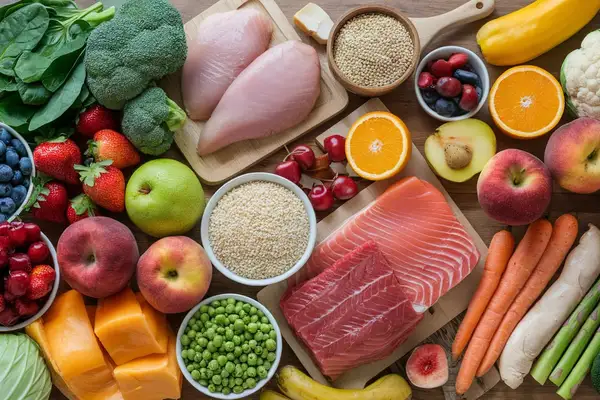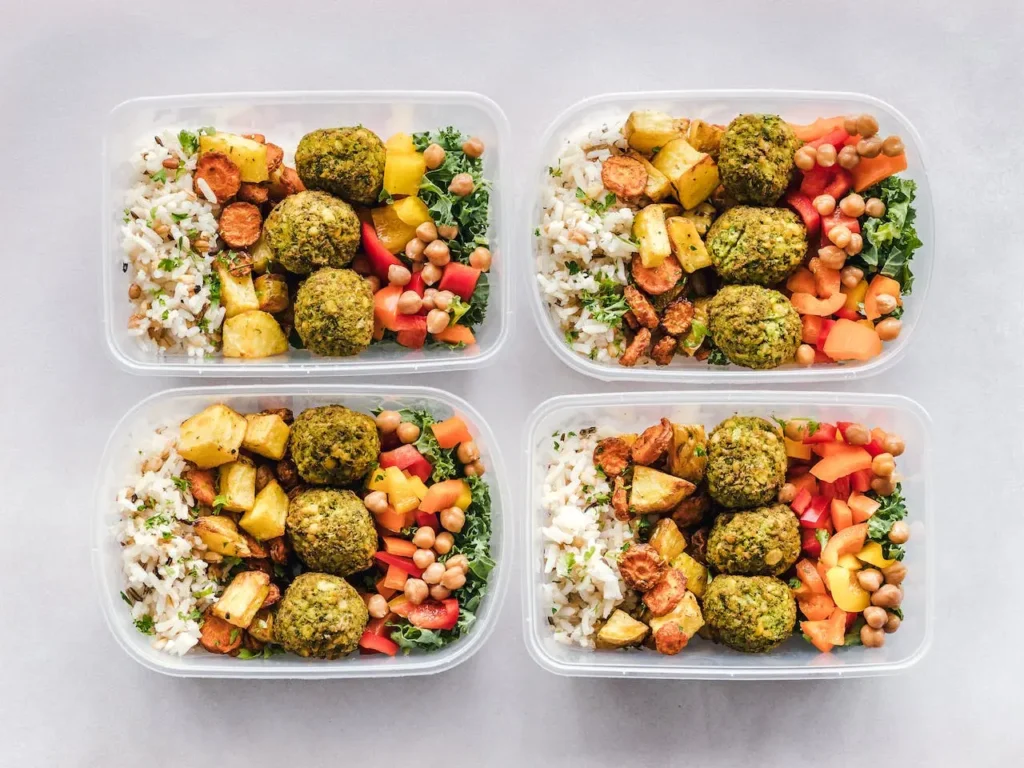7-Day Lion Diet Meal Plan: Healthy Meals to Eat Each Day

This post may contain affiliate links, meaning I may earn a commission if you make a purchase, at no extra cost to you. I only recommend products I trust. Thank you for your support.
The lion diet is a highly restrictive elimination diet that focuses on eating only meat from ruminant animals (such as beef, bison, lamb, goat, venison, elk), along with salt and water.
It is an extreme version of a carnivore diet, eliminating all other food groups like fruits, vegetables, grains, dairy, etc.
The lion diet is intended to be a “healing elimination diet” that aims to heal a “leaky gut” caused by factors like a standard American diet, medications, or an imbalanced gut microbiome.
By eliminating all potential inflammatory foods and focusing only on ruminant meats, the diet claims to reduce inflammation and autoimmune symptoms
The lion diet was created and popularized by Mikhaila Peterson as a way to heal her autoimmune issues and other health problems.
Given its restrictive nature, understanding the ins and outs of the lion diet is essential for anyone curious about or considering this dietary experiment, including what to eat on the lion diet, its potential benefits, and its inherent risks.
What to Eat on the Lion Diet
The lion diet food list only includes meat from ruminant animals. In later stages, some people may slowly reintroduce a few other foods like mackerel, honey, and parsnips.
Here’s a comprehensive lion diet food list:
Ruminant meats
- Beef
- Bison
- Lamb
- Goat
- Venison (deer)
- Elk
- Antelope
- Moose
Organ meats
- Liver
- Heart
- Sweetbreads
- Kidney
- Bone marrow
- Spleen
Wild game meats
- Elk
- Venison
- Antelope
Other foods
- Salt
- Water
Foods to Avoid on the Lion Diet
The lion diet is a highly restrictive diet based on the concept of eating only ruminant meats, similar to how lions primarily consume large prey animals.
The diet excludes many foods that wild lions might occasionally eat, such as:
- Pork
- Poultry
- Fish
- Seafood
- Eggs
- Dairy
- Fruits and vegetables
- Grains
- Legumes
- Alcohol
- Caffeine
- Non-Ruminant Animal Products
7-Day Lion Diet Meal Plan (Lion Diet Menu)
This 7-day Lion Diet meal plan features ruminant meats like beef, bison, lamb, and venison. It is intended as a short-term elimination diet to potentially identify and address food sensitivities.
The specific lion diet meals, portion sizes, and timing can be flexible based on individual hunger and preferences, but the diet remains extremely restrictive throughout the 7 days.
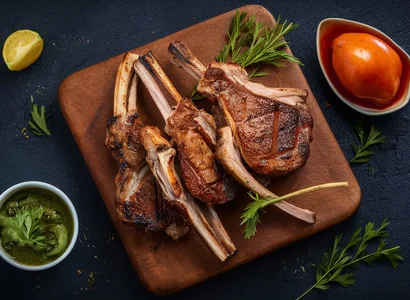
Day 1
Breakfast:
- Beef Steak and Bone Marrow: Season beef steak with salt and grill to the desired doneness. Roast bone marrow in the oven until tender and spreadable. (8 oz beef steak, 2 oz roasted bone marrow, salt)
Lunch:
- Grilled Lamb Chops: Season lamb chops with salt and grill until cooked through. (8 oz lamb chops, salt)
Dinner:
- Bison Burgers: Form ground bison into patties, season with salt, and grill. (8 oz ground bison, salt)
Snacks:
- Venison Jerky: Season venison strips with salt and dehydrate in a low oven or dehydrator. (4 oz venison strips, salt)
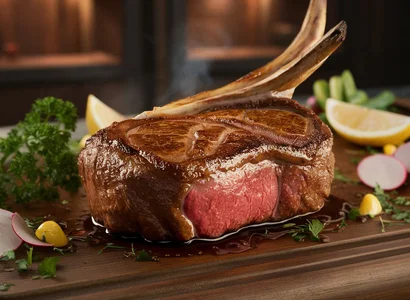
Day 2
Breakfast:
- Lamb Sausage: Form ground lamb into sausages, season with salt, and cook in a skillet. (6 oz ground lamb, salt)
Lunch:
- Goat Stew: Simmer goat meat in salted water until tender. (8 oz goat meat, salt, water)
Dinner:
- Elk Steak: Season elk steak with salt and grill to the desired doneness. (8 oz elk steak, salt)
Snacks:
- Bison Jerky: Season bison strips with salt and dehydrate in a low oven or dehydrator. (4 oz bison strips, salt)

Day 3
Breakfast:
- Venison Bacon: Cook venison bacon in a skillet until crispy. (6 oz venison bacon, salt)
Lunch:
- Grilled Antelope Ribs: Season antelope ribs with salt and grill until cooked through. (8 oz antelope ribs, salt)
Dinner:
- Moose Roast: Season moose roast with salt and roast in the oven until tender. (8 oz moose roast, salt)
Snacks:
- Lamb Jerky: Season lamb strips with salt and dehydrate in a low oven or dehydrator. (4 oz lamb strips, salt)

Day 4
Breakfast:
- Goat Sausage: Form ground goat into sausages, season with salt, and cook in a skillet. (6 oz ground goat, salt)
Lunch:
- Grilled Venison Tenderloin: Season venison tenderloin with salt and grill until cooked to desired doneness. (8 oz venison tenderloin, salt)
Dinner:
- Lamb Liver: Season lamb liver with salt and pan-fry until cooked through. (8 oz lamb liver, salt)
Snacks:
- Elk Jerky: Season elk strips with salt and dehydrate in a low oven or dehydrator. (4 oz elk strips, salt)

Day 5
Breakfast:
- Bison Sausage: Form ground bison into sausages, season with salt, and cook in a skillet. (6 oz ground bison, salt)
Lunch:
- Grilled Moose Shoulder: Season moose shoulder with salt and grill until cooked through. (8 oz moose shoulder, salt)
Dinner:
- Beef Back Ribs: Season beef back ribs with salt and slow-cook until tender. (8 oz beef back ribs, salt)
Snacks:
- Goat Jerky: Season goat strips with salt and dehydrate in a low oven or dehydrator. (4 oz goat strips, salt)
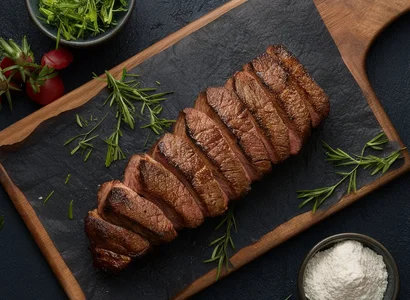
Day 6
Breakfast:
- Elk Sausage: Form ground elk into sausages, season with salt, and cook in a skillet. (6 oz ground elk, salt)
Lunch:
- Grilled Beef Tenderloin: Season beef tenderloin with salt and grill until cooked to desired doneness. (8 oz beef tenderloin, salt)
Dinner:
- Venison Kidney: Season venison kidney with salt and pan-fry until cooked through. (8 oz venison kidney, salt)
Snacks:
- Antelope Jerky: Season antelope strips with salt and dehydrate in a low oven or dehydrator. (4 oz antelope strips, salt)

Day 7
Breakfast:
- Hamburger Patties: Form ground beef into patties, season with salt, and grill. (8 oz ground beef, salt)
Lunch:
- Grilled Elk Shoulder: Season elk shoulder with salt and grill until cooked through. (8 oz elk shoulder, salt)
Dinner:
- One Ribeye Steak: Season ribeye steak with salt and air-fry to desired doneness. (8 oz ribeye steak, salt)
Snacks:
- Venison Jerky: Season venison strips with salt and dehydrate in a low oven or dehydrator. (4 oz venison strips, salt)
Potential Benefits of the Lion Diet
While the lion diet is highly restrictive and controversial, proponents claim several potential benefits:
- Anti-inflammatory Effects: Ruminant meats are low in carbohydrates and lack common dietary allergens and irritants, potentially reducing inflammation in the body.
- Autoimmune Relief: Some individuals with autoimmune conditions report decreased symptoms and flare-ups due to the reduction of dietary triggers.
- Gut Healing: By removing processed foods, additives, and potential irritants, the gut lining may have an opportunity to heal and strengthen.
- Cognitive Function: Supporters claim improved mental clarity, focus, and cognitive function, potentially due to the reduction of dietary allergens and inflammatory foods.
- Caloric Control: The restrictive nature of the diet may naturally lead to a reduction in calorie intake, aiding weight loss.
- Stable Blood Sugar Levels: The diet’s lack of carbohydrates may lead to more stable blood sugar levels, reducing insulin spikes and crashes.
- Elimination of Common Allergens: By consuming only meat and salt, common allergens such as gluten, dairy, and certain plant-based compounds are eliminated, potentially reducing allergic reactions and sensitivities.
- Reduction in Acne and Eczema: Some proponents report clearer skin and reduced symptoms of skin conditions like acne and eczema, possibly due to the anti-inflammatory nature of the diet.
- Natural Detox: Some proponents believe that the diet supports the body’s natural detoxification processes.
Potential Risks of the Lion Diet
While some individuals report benefits, there are several significant risks and concerns associated with a restrictive diet such as the lion diet:
- Lack of Essential Nutrients: The diet excludes entire food groups, potentially leading to deficiencies in vitamins and minerals such as vitamin C, vitamin A, vitamin K, magnesium, potassium, and fiber.
- Absence of Antioxidants: Fruits and vegetables, which are rich in antioxidants, are excluded, potentially impacting the body’s ability to fight oxidative stress.
- Constipation: The absence of dietary fiber from fruits, vegetables, and grains can lead to constipation and other digestive issues.
- Gut Microbiome Imbalance: A lack of diverse foods can negatively impact the gut microbiome, potentially leading to dysbiosis and compromised gut health.
- High Saturated Fat Intake: Consuming large amounts of red meat can lead to a high intake of saturated fats, potentially increasing the risk of heart disease and high cholesterol levels.
- High Protein Load: The high protein content of the diet can strain the kidneys, especially in individuals with pre-existing kidney conditions.
- Potential for Toxins: Consuming large amounts of red meat, particularly organ meats, can lead to the accumulation of toxins and heavy metals, potentially burdening the liver.
- Calcium Deficiency: The exclusion of dairy and other calcium-rich foods can lead to a deficiency, potentially compromising bone health and increasing the risk of osteoporosis.
- Impact on Hormones: The lion diet may affect hormone levels due to the lack of essential fats, vitamins, and minerals, potentially impacting menstrual health in women and overall hormonal balance in both genders.
Conclusion
Embarking on the lion diet is more than a dietary change; it’s a radical shift towards simplicity and sustainability within the realm of nutrition.
Considering the lion diet’s restrictive nature, it’s clear that while it may not be for everyone, its benefits could be significant for those struggling with food intolerances or seeking a minimalist approach to eating.
The journey through the lion diet we depicted, rich in protein and simplicity, suggests an intriguing avenue for personal health exploration.
As you contemplate integrating any aspects of the lion diet into your life, remember the importance of proceeding with caution and consulting with a healthcare provider to ensure it aligns with your individual health needs and goals.
- Gastric bypass diet
- Ozempic diet plan
- 7-day animal based diet
- 7-day vegetarian meal plan
- Vegan meal plan
- 30-day carnivore diet meal plan
- 7 day GOLO meal plan
- Why the paleo diet is unhealthy
- 2 weeks Atkins diet
- Clean eating recipes for beginners
- 3-day military diet plan
- 15 foods high in protein
- 7-day no sugar diet menu
- 7-day metabolic confusion diet
- 7-day animal based diet
- 15+ Blue zone diet recipes
FAQs
Is the lion diet actually healthy?
Yes, the lion diet can be healthy. It has been shown to help with various health issues, including autoimmune conditions, depression, and neurodegenerative diseases.
However, the lion diet can lead to nutritional deficiencies due to the exclusion of essential food groups. Long-term adherence is not recommended without medical supervision.
Can you eat rice in lion diet?
No, you cannot eat rice on the lion diet. The Lion Diet is a strict all-meat diet that only allows ruminant meat (such as beef and lamb), salt, and water.
Are eggs ok on a lion diet?
No, eggs are not allowed on the lion diet. The lion diet is a more restrictive version of the carnivore diet, which only permits ruminant meat, salt, and water. Other animal products like eggs are not part of the lion diet
Can You Drink Beer on the Lion Diet?
No, you cannot drink beer on the Lion Diet. The diet excludes all beverages except water. Beer, being a fermented grain beverage, is not permitted.
What salt to use on Lion diet?
Any pure, natural salt can be used on the lion diet. Sea salt, Himalayan pink salt, and kosher salt are all acceptable choices. The key is to use unrefined salt without additives.
Does the lion diet put you in ketosis?
Yes, the lion diet is a ketogenic diet that puts the body into a state of ketosis. Since it is extremely low in carbohydrates and high in fat and protein, the body may enter a state of ketosis, burning fat for energy instead of carbohydrates.
Why did Paul Saladino quit the carnivore diet?
Paul Saladino quit the strict carnivore diet to incorporate more plant-based foods for a more balanced approach. He found that including certain fruits and vegetables helped him achieve better overall health and nutrition.
What is the lion diet for 30 days?
The Lion Diet for 30 days involves eating only meat from ruminant animals, salt, and water for a period of time, often 30 days or more.
This strict elimination diet aims to reset the body by removing potential dietary triggers and allergens, potentially reducing inflammation and improving health.
Resources
Disclaimer: The Lion Diet is highly restrictive and can lead to nutritional deficiencies and other health risks. This diet is not recommended for long-term use without professional medical supervision.
Individuals should consult with a healthcare provider before starting the Lion Diet to ensure it is safe and appropriate for their specific health needs.
The information provided here is for educational purposes only and should not be considered medical advice.
